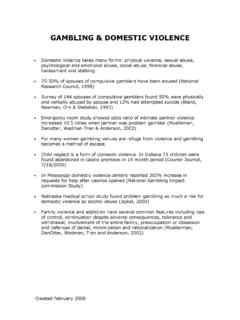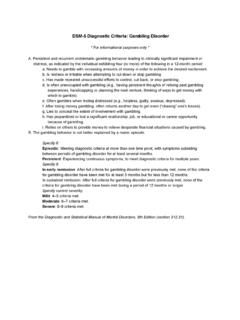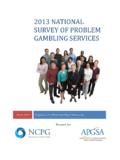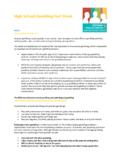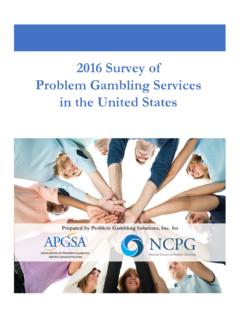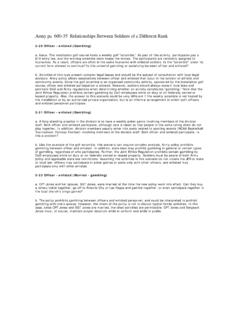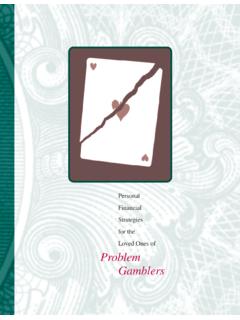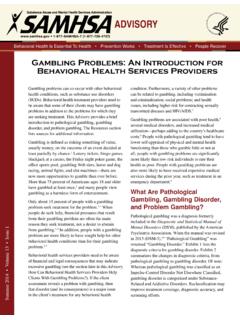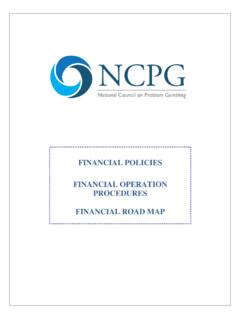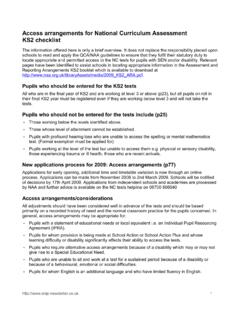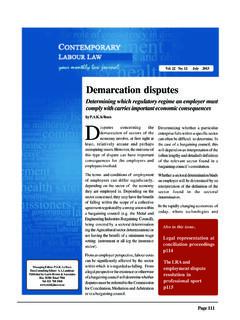Transcription of Problem Gamblers and Their Finances - NCPG
1 Problem Gamblers and Their FinancesA Guide for Treatment ProfessionalsNational Council onProblem GamblingNCPG Counselors Cover 1/6/03 11:43 AM Page 1 Problem Gamblers and Their FinancesA Guide for Treatment ProfessionalsThis handbook is meant to provide general financial information; itis not meant to substitute for, or to supersede, professional orlegal people depicted in this publication are professional modelsand are included here for illustrative purposes only. They are notconnected with the subject matter or situations covered in : The content areas in this material are believed to be currentas of this printing, but, over time, legislative and regulatorychanges, as well as new developments, may date this material.
2 2000 National Endowment for Financial Education. All rights .. 1 Gambling Has Gone Mainstream .. 5 Rise in Problem Gambling .. 6 Social and Personal Costs .. 6 What is Problem Gambling? .. 7 Causes of Problem Gambling .. 8 Stages of Problem Gambling .. 8 Winning Stage .. 8 Losing Stage .. 8 Desperation Stage .. 9 The Gambler s View of Money .. 10 Financial Signs of Problem Gambling .. 10 Warning Signs at Home .. 11 Warning Signs at Work .. 12 Possible Immediate Financial Actions .. 14 Just Say No .. 15 How to Work Financially With the Problem Gambler .. 16 Identifying Assets and Sources of Income .. 17 Sources of Income.
3 17 Financial Assets .. 18 The Gambler s Stash .. 18 The Monitoring that a Loved One Might Do .. 20 Creating a Realistic Spending Plan .. 21 Tips on Cutting Expenses .. 26 Additional Budgeting Tips .. 26 Budgeting Monies for Gambling Treatment .. 26 Limiting the Gambler s Access to Money .. 28 Establish Controls for Paying Household Bills .. 28 Legal Transfer of Assets .. 29 The Use of Trusts .. 31 Problems and Risks of Shifting Ownership .. 31 Large Sums of Money .. 32 Retirement Accounts .. 32 Mortgage Refinancing or Home Equity Loans .. 32 Traditional Pension Plan .. 33 Inheritances .. 33 Investment Accounts (Nonretirement).
4 33 Gambling Winnings .. 33 Lottery Winnings .. 33 Civil Settlements .. 33 Table of ContentsRepaying Gambling Debts .. 34 Determine Amount of Debt and List Creditors .. 34 Establish a Debt Repayment Plan .. 35 Tax Issues .. 37 Declaring Bankruptcy Is a Last Resort .. 39 Being Alert to Life Events .. 40 Working with Family Members .. 40 Wall Street as Riverboat Gambling? .. 41 Warning Signs of an Investment Gambling Problem .. 42 Pros and Cons of the Gambler as Investor .. 43 Financial Resources .. 44 Gambling and Financial Resources .. 45 Acknowledgments .. 46 Appendix A Are You a Problem Gambler or Living with a Problem Gambler?.
5 4720 Questions from Gamblers Anonymous .. 4720 Questions from Gam-Anon .. 48 Appendix B Spending Tips .. 491 Treatment professionals familiar with the psychological back-ground of Problem gambling understand that it is not merely a financial Problem . It is a chronic, progressive behaviordisorder. Financial problems overdue bills, badgering creditors,and impending bankruptcy are the usual symptom of an addictionwhose statistical odds are stacked against the difficulties also seem to be the factor that most frequentlydrives the Problem gambler, or a loved one of the Problem gambler,to finally seek professional treatment of the gambler s addiction.
6 Byhelping the gambler face and cope with the financial pressures andfind long-term solutions to money problems, you, as the treatmentprofessional, can provide the gambler and his or her loved oneswith several major benefits: You allow the gambler to better concentrate on a meaningfulhealing program. As long as financial issues are uppermost in the gambler s mind, effective treatment of the underlyingaddictive behavior can be restricted, if not impossible. You provide the gambler with an immediate sense of hope,especially if financial problems have reached a crisis stage, such as impending bankruptcy. You offer the gambler viable financial options.
7 Problem gamblersfail to see other options to Their gambling; many believe that theonly way out of the financial hole that gambling puts them in isto gamble Their way out. You can help reduce suicidal tendencies, help the gamblerrelearn the true value of money, and lessen the chance of arelapse into gambling first glance, the notion of addressing a gambling client s often complex and disordered financial life may strike you as aninappropriate and overwhelming task. After all, few treatmentprofessionals are specially trained in matters of personal finance ,and many may personally feel uncomfortable or uninformed abouteven basic money management. Moreover, a gambler s financial issues present unique challengesbecause many traditional money management tools employed byfinancial professionals don t work well indeed, may actually becounterproductive when applied to the household Finances of aproblem gambler.
8 Finally, you may have your own psychologicalissues with money or struggles with personal Finances . Thesepersonal issues may impede your effective treatment of thecompulsive gambling client who confesses to betting thousands of dollars a week, of having $50,000 or $100,000 or even more in gambling debts!That s why this guide was prepared by the National Endowmentfor Financial Education (NEFE ) and the National Council onProblem Gambling. It is designed to provide you, as the treatmentprofessional, with a basic understanding of the financial issues thatconfront the Problem gambler, and what financial strategies canhelp the gambler and his or her family stabilize and improve theirfinancial guide addresses such issues as financial warning signs of agambling Problem and ways to identify sources of income andassets that potentially can feed the gambler s habit.
9 It illustrateshow to establish a workable household budget, remove household2finances and assets from the gambler s control, and set up arealistic repayment schedule for gambling and other debts. It alsolooks at bankruptcy, financially stressful life events, taxes, and thecontroversial issue of investing. You will come away with a betterunderstanding of basic financial terminology and concepts. A list of financial resources is included at the end of the material in this guide is not intended to transform the treatmentprofessional into an expert in personal finance , nor to act as asubstitute for financial professionals. Indeed, it often is imperativeto encourage the client to work with financial professionals such asdebt counselors, financial planners, attorneys, or CPAs.
10 However, it also is important that you not merely refer clients to a financialprofessional and from that point on discuss nothing regarding theirfinancial problems. You should work closely with financial professionals to help yourclients, and having a basic understanding of the financial issuesinvolved will enhance that professional relationship. Understandingand addressing the financial issues during your therapy work withclients also will enhance the chances for a positive outcome to thisdevastating : Problem gambling experts recommend that a gambler sfinancial problems not be addressed until the gamblerrecognizes that he or she has a gambling Problem , hasabstained from betting for an appropriate period of time(usually, at least 30 days), and has begun to address theunderlying psychological disorder!
